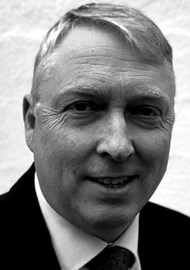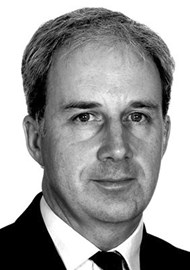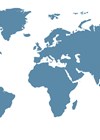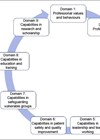A few years ago we published stories from three international medical graduates detailing their experience of working as registrars in the UK (https://www.urologynews.uk.com/education/trainees-forum/post/initial-impressions-of-urology-in-the-uk-from-overseas-trainees). Here are three new countries and three new opinions.
Dinelle Sirjuesingh, Trinidad and Tobago

Trinidad and Tobago are the southernmost islands of the Caribbean located about 11km from the north-eastern coast of Venezuela with a population of about 1.3 million people. There is a two-tiered healthcare system in place, with both public and private providers – the government-run Ministry of Health is ultimately responsible for the provision of free healthcare for the public.
I started my medical career in the urology department of San Fernando General Hospital which captures about 600,000 of the southern population in Trinidad. I worked there for four and a half years as a house officer. During those years, my senior colleagues chronicled their past experience to me and what I took away was that urology in Trinidad has had a tumultuous journey. Historically, Caribbean nations have faced lack of funding, infrastructural deficiencies and paucity of trained medical personnel in urology. These factors have led to a lack of access to specialist urology services and a delay in the implementation of innovative, ‘gold-standard’ procedures commonly available in countries traditionally thought of as ‘first world’. The paradox is that although Caribbean nations have high incidences of some urological conditions such as prostate cancer, the local healthcare systems undervalue urology services.
In 2006, the University of the West Indies commenced a urology postgraduate residency programme in Trinidad and Tobago led by Dr Lester Goetz, my mentor. The programme is five years long with the first two years focusing on core surgery. This has helped standardise urological training across the region and has become an advocate for better urology services. In addition, partnerships with other countries have generated training opportunities for urologists in the Caribbean and the adoption of minimally invasive surgical techniques.
The Caribbean Urological Association is an affiliate of Société Internationale d’Urologie (SIU) with attendant privileges and designated San Fernando General Hospital as an SIU Training Centre in 2010.
Contrastingly, the UK has had a well-established and advanced urology practice for decades and in-depth and diverse training that covers all urology sub-specialities – a stark contrast to the Caribbean where the focus has historically been on general urology.
Urological conditions: an overview
The prevalence of urological conditions such as benign prostatic hyperplasia (BPH), prostate cancer, kidney stones and urinary incontinence is high in Trinidad and Tobago and indeed throughout the Caribbean.
Prostate cancer mortality in the Caribbean region is among the highest in the world and it is the most common cancer in Trinidad and Tobago where its management remains a challenge. Our patients usually present with advanced or metastatic disease, but this has been changing in recent years with prostate specific antigen (PSA) screening programmes and prostate cancer awareness initiatives across the country.
In the UK the routine use of sub-capsular orchidectomy for androgen blockade is almost unheard of, but all major public hospitals in Trinidad and Tobago carry out sub-capsular orchidectomy as a day-case procedure under local anaesthesia. Chemical androgen deprivation in Trinidad and Tobago is used but these drugs are not always available and it is much more economical to treat with surgical castration.
Stone disease is very common in both Colchester and in Trinidad and Tobago and ureteric stenting is one of the most common emergency procedure in both regions. In San Fernando General Hospital a majority of ureteric stents are inserted under sedation in an operating theatre with only a urology doctor, an assistant, and a registered nurse. Sedation is often used because of shortages of anaesthetists, nurses, and beds – this has dramatically decreased the burden on the general emergency theatre list.
According to the International Diabetes Federation, the prevalence of diabetes in Trinidad and Tobago in 2021 was 14.8% compared to 10.5% globally. I mention this fact because it is the most common risk factor for Fournier’s gangrene. I could not find any data to quote but my experience is that the incidence in Trinidad and Tobago seems to be significantly greater than in Colchester. At San Fernando General Hospital, we saw around three cases per month.
Journey to the UK: challenges, new experiences and the way forward
It’s essential to note, the UK urology experience is not without issues. I moved to the UK to pursue urology in September 2022. The experience was one that was daunting at first, but I eventually became comfortable. In Trinidad and Tobago, the healthcare system primarily uses paper – we can access pathology and radiology reports on computers but there are limited computers for each ward. In the UK, there are multiple computers on each ward but the medical software was different and a major hurdle for me to overcome was understanding the use of these medical software systems.
On a lighter note, a unique challenge I encountered was adapting to the different meaning of words used in the UK. Interestingly, the word ‘sick’ in the UK means to vomit. I learned this the first time I took a history from a patient. I asked, “what symptoms are you experiencing?” and the patient replied, “I was sick twice”. I pondered for a moment on what he meant, then asked “how exactly are you sick?” He then showed me the sickness bag, which I know to be a vomit bag. From then I understood the word sick is synonymous with vomit. There were many other words that I learned had alternate meanings.
We don’t have robotic services in the public health sector in Trinidad, and this technology was a new experience for me. It took me a while to understand the machine and how it worked but robotic surgery is certainly one of the reasons I chose to pursue urology in the UK.
The UK is a wonderful place to learn urology and I am absolutely enjoying my experience. I wish to join a UK urology training programme soon and someday serve my country through the skills I acquire. I am truly fortunate to experience urology in two different regions and would love to be exposed to more. Urology has its differences globally, but the basic principles of urologic surgery are the same from a twin island in the Caribbean to another island in the North of Europe.
Lori-Ann Vaz, Jamaica

I am a fourth-year urology trainee from the University of the West Indies, Jamaica and I came to the UK to fulfil a one to two year overseas elective as required by my training programme.
Differences in urology practice between the UK and Jamaica
1. Patient population:
In Jamaica, the majority of patients are of Afro-Caribbean descent, whereas in the UK, the majority are Caucasians. This demographic contrast significantly impacts the types of pathologies encountered in daily practice, such as a higher incidence of priapism and prostate cancer. Notably, the UK benefits from good primary healthcare and patients exhibit better health-seeking behaviour. Consequently, many pathologies are detected and treated at an earlier clinical stage in the UK.
2. Pathology:
Prostate cancer is the most prevalent cancer in Jamaica, with an incidence of 87.6 per 100,000 (Globocan 2020) and patients often present with more advanced grades and stages of the disease. In contrast, the UK reports an incidence rate of 77.9 per 100,000, and in my anecdotal experience, patients tend to present with less aggressive and earlier-stage prostate cancer.
The UK has a higher incidence of bladder cancer (7.1 per 100,000) compared to Jamaica (3.1 per 100,000) (Globocan 2020). As a result, the UK has established a more robust programme for the diagnosis and surveillance of bladder cancer.
Additionally, differences in the types of cases seen in the emergency setting are notable. In Jamaica, there is a higher prevalence of both blunt and penetrating urological trauma, priapism, Fournier’s gangrene, and xanthogranulomatous pyelonephritis. This is likely due to socioeconomic factors and the high prevalence of the sickle cell trait (10%) in Jamaica.
3. Diagnostics and equipment:
In Jamaica, prostate biopsies are typically conducted via the transrectal route and it is possible that cost considerations may contribute to the delayed adoption of transperineal biopsies.
The ready availability of disposable digital ureteroscopes at Colchester General Hospital greatly enhances the experience of stone surgery, improving visibility but these disposables are not readily available in Jamaica’s public healthcare setting. Moreover, disposables for laparoscopic and endoscopic procedures are in routine use in the NHS while patients in Jamaica must purchase them privately, limiting accessibility.
4. Surgical practice:
A notable contrast in surgical practice at Colchester General Hospital is the extensive use of robotic surgery and minimally invasive techniques including Rezūm™ and UroLift®. In Jamaica, laparoscopic surgery is common but there is still a significant demand for open surgery. Open prostatectomy remains the preferred procedure for treating BPH in patients with larger prostates, as opposed to holmium laser enucleation of the prostate (HoLEP) at Colchester General Hospital.
In conclusion, my experience working in the UK has been nothing short of remarkable. I have acquired a wealth of knowledge and skills that I am eager to integrate into my practice.
Federico Rovengo, Argentina

Medical school in Buenos Aires takes six years – the last year is an unpaid internship that you need to complete to obtain the degree. I then started my training in general surgery in a private hospital and obtained my master’s degree after four years. After three years of urology training, I was awarded a master’s degree in urology and worked at the same hospital for a year as an associate specialist. When I decided to leave I was worried that in the UK I might not have the opportunity to have my own list of patients and perform the same procedures I was doing in Argentina.
Difficulties and the challenge of getting a job in the UK
After some research I found that the UK was a good place to get trained in robotic surgery. In Argentina we have just three robots in the whole country. I contacted an Argentinian urologist, Tomas Rosenbaum, who has been working in London for many years – he gave me very helpful advice and put me in contact with Colchester Hospital. After many emails with the HR department, I finally understood the requirements to apply for a job. It took me 18 months to get to the UK following exams, paperwork, an interview and the COVID pandemic.
An overview of urology practice in ArgentinaIn
Argentina I was working from 07.30 till 20.00 every day and was on call two weekends per month – I did not have any days off after being on call. The day consisted of a ward round on my own: reviewing patients, writing in the notes and completing drug charts and discharge letters. With respect to operating – some days were whole days in theatre, other days were a half day in theatre and a half day in clinic. You go home once the job is done; in other words, when there are no more patients to be seen.
In theatre we did not have any formal briefing – you look for the nurse that will be in your theatre and tell her what you will need. We did not have the need to present ourselves, as the staff don’t change and after a week working in any hospital you get to know almost everyone. You do the operation always with a consultant, but they will let you do it if they see that you are capable.
What is an SHO? This was one of my first questions!
My first weeks in Colchester Hospital were tough. Despite being confident with my urological knowledge, it was very hard to get used to the UK system. On one hand the schedule was more organised. My contract was 40 hours a week with a 1:7 rota and two days off after a weekend on call. I discovered new ways of working, for instance, briefing before the operation, doing the rounds with an advanced nurse practitioner, foundation year one, senior house officer and consultant, follow-up of oncologic patients by nurses, admin time and multidisciplinary team meetings. All those things and many more, were new to me. Additionally, on calls were much busier than in Argentina and despite working fewer hours I found the job very demanding.
It took me a full year to get used to the UK healthcare system and during this time, I wondered when I could get back to Argentina. Despite this I found the UK a good place to develop my career and evolve as a urologist. All the people I have had the opportunity to work with were very kind and supportive. The difficult decision to now make is which pathway to choose, the Certificate of Eligibility for Specialist Registration (CESR) or the training route, both of which are challenging and time consuming.












